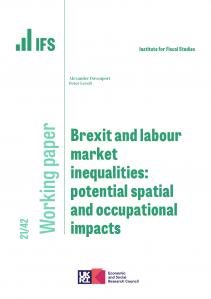IFS PRESS RELEASE
Council funding reform may mean big winners and losers
Major changes to councils’ funding are making councils much more dependent on the amount of council tax and business rates raised locally. The Business Rates Retention Scheme currently allows local areas in England to keep up to 50% of the growth in their business rates revenues that result from new developments. Our analysis, based on published revenue outturns and forecasts shows that:
- 52 (mostly district) councils are forecast to see their overall funding boosted by 5% or more by the scheme between 2013–14 and 2016–17, compared to what they would have received if business rates had been pooled and the amount received by each council had instead increased in line with national growth in business rates revenues.
- On the other hand, 119 councils, including most county councils and metropolitan boroughs, will be relative losers under the scheme, though none will have lost more than 2% of their funding.
As part of truly revolutionary reforms to local government in England, by 2020 councils will retain 100% of business rates revenues:
- This will provide a stronger financial incentive for growth but also mean more budgetary risk: councils’ potential gains will be larger, but so too will their potential losses. Greater funding divergence could lead to greater divergence in council service quality across England;
- If it works like the current system, some councils could gain and others lose significant sums, even if business rates revenues grow at the same rate across all councils. This rather counter-intuitive outcome could be addressed via some simple technical changes to the way the scheme works, without blunting the financial incentives for growth it is meant to provide.
These are among the findings in a new report by researchers at the Institute for Fiscal Studies launched today. It is the first report in a major new programme of research, funded and supported by The Local Government Finance and Devolution Consortium, consisting of private sector and public sector organisations. In coming months and years, researchers will examine the key issues, opportunities and risks arising from major changes to local government finance systems across Great Britain.
The report looks at councils’ budgets since 2009–10, and finds:
- Excluding education spending, councils in England plan to spend around 22% less on service provision in 2016–17 than they did in 2009–10.
- Cuts in Scotland and Wales, at 15% and 11.5% respectively, have been smaller. This is partly because of the devolved governments’ decisions to protect health spending to a lesser extent than in England allowing smaller cuts to other areas. And in Wales’ case council tax bills have risen substantially more than in England.
- In England, cuts have been much larger for poorer, more grant-dependent councils than their richer neighbours, who can raise more of the money they need via their own council tax revenues.
- The mainly urban and poorer councils among the tenth which are most grant-reliant have had to cut their spending on services by 33% on average, compared to 9% for those richer councils among the tenth which are least grant-reliant.
- This pattern arose directly from the way central government allocated grants. Tweaks made between 2011-12 and 2013-14, which were supposedly intended to mitigate this, were largely ineffective. They were abandoned in 2014–15 and 2015–16.
- Overall this period was characterised by a lack of consistency and transparency in the allocation of funding to councils, and outcomes that were sometimes at odds with stated intentions of protecting poorer councils
- In 2016–17, the grant formula was changed again and will now deliver much more equal cuts to overall spending power across councils.
- More generally though, reforms in England over the last few years have represented a move away from funding equalisation and towards the provision of fiscal incentives for economic and housing development via the Business Rates Retention Scheme and the New Homes Bonus.
As the scope of the business rates retention scheme expands there will be difficult trade-offs to make between providing financial incentives and preventing dramatic divergence in funding. Government also has some difficult decisions to make over which additional services to devolve to councils alongside their new business rates revenues: it will be easier to ensure the new revenues match new spending responsibilities in year one than it will in the years ahead.
“The changes to local government finance in England during the 2010s will be truly revolutionary. We will have moved from a system where equalisation and insurance was paramount, to one with much more emphasis on incentives for growth, but also more financial risk for councils.” said David Phillips, a senior research economist, and an author of the report, “Along the way there will be lots of tricky policy decisions. And there are big picture questions, such as whether these changes will actually empower councils to deliver more growth, or just burden them with additional revenue and spending risks. The IFS’s new programme will look at both types of issues, in an effort to ensure this revolution is subject to proper public scrutiny.”
______________________________________
ENDS
Notes to Editors:
- Table 1 shows the estimated relative gains/losses under the BRRS by type of council and by region of England. Note that figures reported in the Table and in the press release are based on revenue outturns for 2013–14 and 2014–15, and January 2016 forecasts for 2015–16 and 2016–17 (which are subject to revision).
Table 1. Relative gains and losses as a result of the BRRS (2013–14 to 2016–17), expressed as a percentage of councils’ overall funding, by council type and region
Council Type | Mean | 10th percentile | Median | 90th percentile |
Shire Districts | 3.5% | 0.5% | 3.2% | 6.7% |
County Councils | -0.2% | -0.3% | -0.2% | 0.0% |
Metropolitan Boroughs | -0.2% | -0.9% | 0.0% | 0.7% |
Unitary Authorities | 0.2% | -0.7% | 0.2% | 1.0% |
Fire Authorities | -0.3% | -0.6% | -0.3% | 0.1% |
London Boroughs (inc GLA) | -0.3% | -0.6% | 0.8% | 5.4% |
|
|
|
|
|
Region |
|
|
|
|
East of England | 0.4% | N/A | N/A | N/A |
East Midlands | 0.7% | N/A | N/A | N/A |
London | -0.3% | N/A | N/A | N/A |
North East | -0.4% | N/A | N/A | N/A |
North West | -0.1% | N/A | N/A | N/A |
South East | 0.4% | N/A | N/A | N/A |
South West | 0.1% | N/A | N/A | N/A |
West Midlands | 0.0% | N/A | N/A | N/A |
Yorkshire & The Humber | 0.4% | N/A | N/A | N/A |
Note: 10% of councils of a specific type have lost more / gained less than the 10th percentile, 50% have lost more / gained less than the median, and 90% have gained less than the median. Distributions of gains/losses by region are not reported as they are strongly affected by the number of different types of councils (e.g. UAs versus shire districts), making comparisons across regions potentially misleading.
Source: Authors calculations using business rates revenues outturns (NNDR3) for 2013–14 and 2014–15 and forecasts (from NNDR1 2016–17) for 2015–16 and 2016–17, and other revenues from revenue expenditure and financing outturns (2013–14 to 2015–16) and estimates (2016–17).
- A time of revolution: British local government finance in the 2010s will be published on the IFS website at 00.01 Wednesday 26 October 2016. For embargoed copies, please contact Bonnie Brimstone at @email or 020 7291 4818 / 07730 667 013.
The findings of this report will be presented at an event, 09:00-11:00 on Wednesday 26 October. For more information and to reserve your place, please go to https://www.ifs.org.uk/events/1379
- This research is the first output from a major programme of work funded by The Local Government Finance and Devolution Consortium. This consortium is generously supported by Capita, CIPFA, ESRC and PwC and is also supported by the Municipal Journal and a large group of local government bodies, including 27 non-metropolitan counties and a number of unitary, district, metropolitan, and London councils.
Drawing on funding and expertise from the consortium, and working with partners in Wales and Scotland, over the next few years, IFS researchers will engage in a wide-ranging programme of research on local government finance and devolution. This includes assessing the impact of changes to funding and funding systems so far, and a range of live policy issues related to 100% business rates retention in England, and reform of local taxes in Scotland and Wales. The programme will also look beyond current policy proposals to examine the rationale and potential effects of alternative or broader changes to local tax and spending powers. And it will bring together existing, and if possible, new evidence, on the extent to which the financial incentives inherent in local financial incentives affect local economic growth and service provision.









